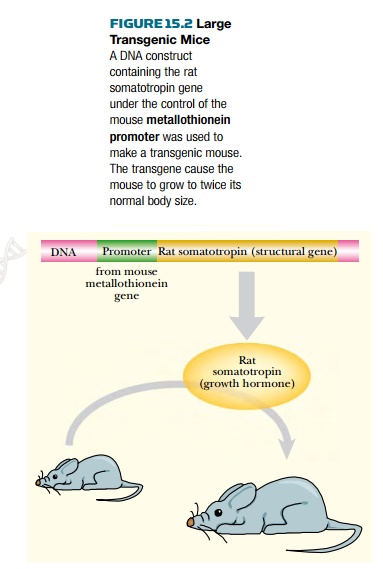Chapter: Biotechnology Applying the Genetic Revolution: Transgenic Animals
Larger Mice Illustrate Transgenic Technology
LARGER
MICE ILLUSTRATE TRANSGENIC TECHNOLOGY
The classic illustration of
transgenic technology was the creation of larger mice by inserting the rat gene
for growth hormone. Growth hormone, or somatotropin,
consists of a single polypeptide encoded by a single gene. In 1982 the
somatotropin gene of rats was cloned and inserted into fertilized mouse eggs.
The eggs were then placed into foster mother mice that gave birth to the
genetically engineered mice. These transgenic mice were larger (about twice
normal size), although not as large as rats. This was the first case where a
gene transferred from one animal to another not only was stably inherited, but
also functioned more or less normally.

To express the rat
somatotropin gene, it was put under the control of the promoter from an
unrelated mouse gene, metallothionein,
which is normally expressed in the liver
(Fig. 15.2). Instead of being made in the pituitary gland, the normal site
for growth hormone, the rat somatotropin was mostly manufactured in the liver
of the transgenic mice. Even though made in the “wrong” location, the hormone
worked and made the mice larger. Human somatotropin has also been expressed in
mice and also gives bigger mice.
Size does not depend solely
on growth hormone. Defective growth hormone receptors also inhibit growth.
African pygmies rarely grow taller than 4 feet, 10 inches, yet they have normal
levels of human somatotropin. It appears that pygmies have defective growth
hormone receptors. These normally bind the somatotropin circulating in the
bloodstream and are necessary for the hormone to work on its target tissues.
Dwarfism, among nonpygmies, may be due either to defects in production of
somatotropin or to a shortage of receptors. Recombinant human somatotropin (rHST) is now used to treat the
hormone-deficient type of dwarf. However, receptor-deficient dwarfs cannot yet
be successfully treated.
Related Topics